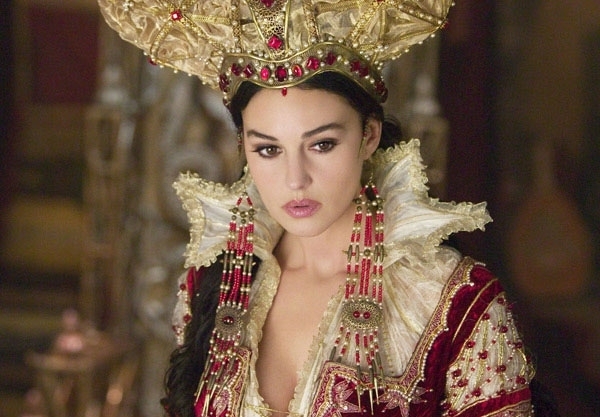Movie review by Greg Carlson
Despite a faithful fan following that clings to the memories of fabulous work like “Monty Python and the Holy Grail” and “Brazil,” Terry Gilliam remains one of the most disappointing major filmmakers of the last thirty-plus years. While many of Gilliam’s visually rich motion pictures contain stunning moments from one of the most expansive and outsized imaginations in cinema, the overall impact of the director’s work is muted and deflated by an incomprehensibleness that challenges the most dedicated viewer. Movies like “The Adventures of Baron Munchausen,” “Twelve Monkeys,” and “Fear and Loathing in Las Vegas” are easier to admire than to actually watch. Sadly, “The Brothers Grimm” cannot be added to that list, as it is neither admirable nor watchable.
Hopelessly miscast, Matt Damon and Heath Ledger star as the famous storytellers, here remolded into oily con artists who prey on superstitious villagers willing to pay hard cash in exchange for Napoleonic-era ghostbusting and exorcism. Will and Jake, as the boys dubiously call each other, blithely travel from town to town in French-occupied territory until their ruse is sniffed out. Facing gruesome torture at the hands of weird officer Cavaldi (Peter Stormare, generally out-acting his hairpiece) the Grimms are spared when a legitimate series of kidnappings in Marbaden depends upon their investigation.
It is difficult to gauge exactly when “The Brothers Grimm” goes off the rails, but it happens early. Gilliam seems happiest constructing ornate set-pieces that literally reconstruct magical theatrics driven by the ancient machinery of crafty showmen. The problem, however, is that the curtain is pulled back too far, and the wonder is mostly sucked out of the spectacle. One of the movie’s central ideas – that the Grimms encounter several of the “real” inspirations for their folkloric narratives – sounds much better on paper than its execution. From Little Red Riding Hood to Snow White to Rapunzel to Hansel and Gretel and even the Gingerbread Man, “The Brothers Grimm” accumulates its fairy tale pedigree so quickly and haphazardly none of the individual characters (including Wilhelm and Jacob) ever takes flight. It borders on painful to report that “Shrek” does all of this much, much better.
“The Brothers Grimm” also invites comparison to lumbering behemoths like “Van Helsing” and “The League of Extraordinary Gentlemen,” two other movies that struggle mightily to blend well-known literary characters with a hip sense of ironic modernism. None of these movies really works on any level, and all succumb to the bluster of explosions and special effects that do absolutely nothing to enhance, extend, or expand the legacies of the intriguing personalities that originally sprang to life on the printed page. It seems as if Gilliam and the other filmmakers are convinced that the subjects are so well-known that attention can be paid instead to noisy, numbing (and CG-aided) hallucinations and apparitions. Without compelling personalities, however, the movie just falls flat.
In “The Brothers Grimm” everything feels unwieldy, awkward, and burdensome (especially Matt Damon’s ridiculous hairstyle and accent). Not even the presence of gorgeous Monica Bellucci, as a wicked queen desperate to regain her youthfulness, mitigates the thudding gloom. Lena Headey, as a cursed tracker named Angelika, reportedly landed the role when Harvey Weinstein refused to sign Samantha Morton (Gilliam’s first choice). Ms. Morton should send flowers, a thank you card, and breathe a sigh of sweet relief.
